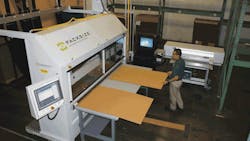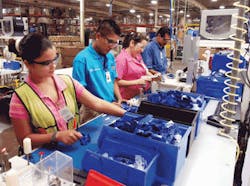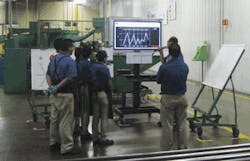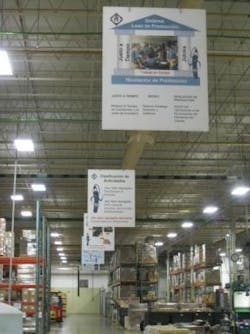Founded in 1944, Franklin Electric has grown from a small electrical motor manufacturing company into a global provider of water and fueling systems found in residential, commercial, agricultural, industrial, municipal, and fueling applications. Headquartered in Fort Wayne, Ind., Franklin Electric now has manufacturing and distribution facilities in Australia, Brazil, Canada, China, Czech Republic, Germany, Italy, Japan, Mexico, South Africa and the United States.
To manage its business amidst such growth, Franklin Electric's core business strategy—continuous improvement—had to become a principal focus through initiatives such as the Kaizen culture, Design for Lean Sigma, Customer Centric Innovation and Business Process Improvement. Lean manufacturing refers to the process of eliminating waste and non-value added activities. By definition, such continuous improvement is a journey consisting of a series of changes aimed at making an organization more effective.
As the global environment evolves, companies must adapt to achieve the goal of offering products and services faster, cheaper and better than the competition.
"We believe that a global approach to continuous improvement strengthens our commitment to the key values of our company: quality, availability, service, innovation and value," says Gregg Sengstack, COO of Franklin Electric. "Our dedicated continuous improvement team has coordinated Kaizen events on product engineering, supply, manufacturing and business process. This focus has directly reduced manufacturing and operating costs, and has yielded gains in quality and efficiency throughout the entire company."
Targeting the Eight Wastes of Lean
Franklin Electric employs the "8 Wastes of Lean: TIM WOODS" philosophy across all of its plants and business units to maximize efficiency. TIM WOODS is not a name, but an easy mnemonic way to remember each of the following wastes:
1. Transport—moving people, products and information.
2. Inventory—storing parts, pieces and documentation ahead of requirements.
3. Motion—bending, turning, reaching, lifting and unnecessary walking.
4. Waiting–for parts, instructions and equipment.
5. Over-production—making more than is immediately required.
6. Over-processing—tighter tolerances or higher-grade materials than necessary.
7. Defects—rework, scrap, warranty and test failures.
8. Skills—under-utilizing capabilities and delegating tasks with inadequate training.
Continuous Skills Improvement
A competitive advantage for continuous improvement is seen through benefits that include reducing time and resources, lowering production costs, improving productivity and quality, and shortening the order-to-delivery time. In most cases, a company that is just embarking on a path to continuous improvement will tackle the easiest goals first to achieve immediate results.
As part of its journey toward lean manufacturing, Franklin Electric adopted the Kaizen culture across many of its plants throughout the world. Kaizen is simply defined as continuous improvement, where Kai stands for continuous or change, and zen means improvement or change. The concept was originated in 1949 by the Toyota Motor Company, and is based on the idea that all employees, at every level, are working toward continuous improvement rather than "temporary" improvements. Continuous improvementThrough years of development, Toyota has demonstrated that the Kaizen concept offers a sustained competitive advantage. It also fosters a culture of learning and experimentation without judgment and blame, with all workers understanding that their opinions are important and useful to the overall system.
Franklin Electric's plant in Linares, Mexico, is an example of the success that Kaizen can offer. Originally started in 2003 with 900 employees, the Linares plant was nominated as one of the "Top Ten Best Places to Work" by the Great Place to Work Institute throughout Mexico and Latin America over the past six years.
Through its success and efforts with Kaizen and lean manufacturing, the Linares plant quickly became a key element in the manufacturing strategy for Franklin Electric. By continuously setting new quality levels and sourcing opportunities for better cost leveraging through lean manufacturing, the company positioned itself to face future challenges. Over the past 10 years, the Linares plant has received a number of certificates and awards, such as the ISO-9001 certification, IndustryWeek's Best Plants 2009 and 2012 Finalist, International Gold Star for Quality 2006 and 2011, Century International Platinum Quality Era Award 2006, and many acknowledgments for safety regulations in Mexico.
The Linares plant attributes its success to its employees who apply lean manufacturing methods each day. Through an effort deemed "Lean Fridays," employees have the opportunity to discuss and show the ideas that help to improve workflow.Another method of lean manufacturing employed at the Linares plant is the "Managing for Daily Improvement" by SQDC board, a visual way of tracking metrics. SQDC stands for safety, quality, delivery and cost. SQDC is just one of many fundamental key tools used in the lean manufacturing journey.
Sustainability and Environmental Initiatives
Franklin Electric is in the process of adopting the 4R concepts of sustainability and environmental management: refuse, reduce, reuse and recycle. Substantial challenges can be found in identifying and understanding the social impact of sustainability and environmental initiatives. These present themselves throughout manufacturing, from the level of unit processing in the plant to enterprise management issues. The packaging process is one of the areas Franklin Electric identified as ripe for management under its 4R sustainability and environmental initiative.
To achieve ECM, tools such as Life Cycle Analysis (LCA) are often used. The concepts of pollution prevention, energy efficiency and the material substitution and maximization of recycled content guide the process.
In the packaging process, materials contribute significantly to overall packaging costs. A small percentage of change to the product packaging can result in a significant reduction in overall costs. Creating boxes in-house and on-demand results in waste reduction and cost savings, while contributing to sustainability initiatives.
The box-making system (On Demand Packaging system from Packsize International, www.packsize.com) is a high-speed package converting machine placed on the pack line. It enables Franklin Electric to produce the right-sized box for every product at the time it is needed. By optimizing ordersize, material requirements, warehouse space and packaging throughput, the system results in less waste, lower shipping costs, decreased damage rates and higher customer satisfaction.
The supply chain becomes:
• Flexible with reduced box inventory;
• Lean by optimizing order size and material requirements;
• Sustainable by driving savings of packaging materials, eliminating fillers, protecting product from damage, and improving transportation efficiencies.
According to the EPA, in 2010 there were almost 76 million tons of container and packaging waste (~38 million tons paper and paperboard) in the U.S. Additionally, about 357 billion square feet of corrugated stock was produced by U.S. paperboard mills in 2010 according to RISI, a global forest products industry information provider.
Franklin Electric's experience suggests that correctly-sized boxes can contribute to both carbon footprint reduction and cost savings. It cut its corrugated usage by about 20% and its filler materials by 60% to 80%. Cost savings at this early stage in the application amount to 25%, but are expected to exceed that as Franklin adds plants, warehouses and distributions centers. Additional savings in those facilities will be realized through less square footage dedicated to racking. The company is planning for a Kaizen event before the end of the year to analyze progress and establish next steps.
About the Author
Tom Andel
Editor-in-Chief
Tom Andel is an award-winning editorial content creator and manager with more than 35 years of industry experience. His writing spans several industrial disciplines, including power transmission, industrial controls, material handling & logistics, and supply chain management.



